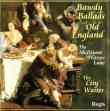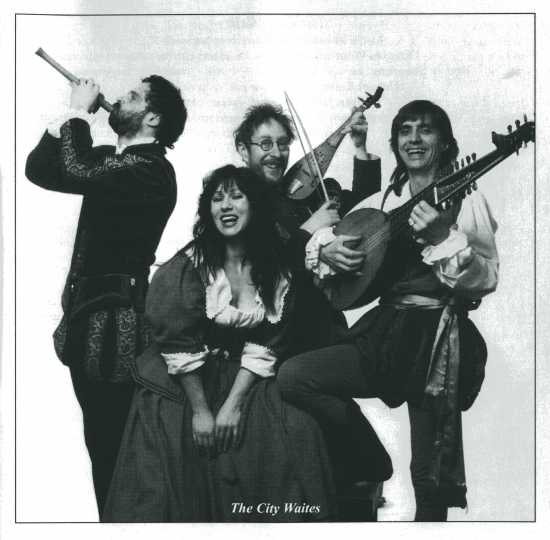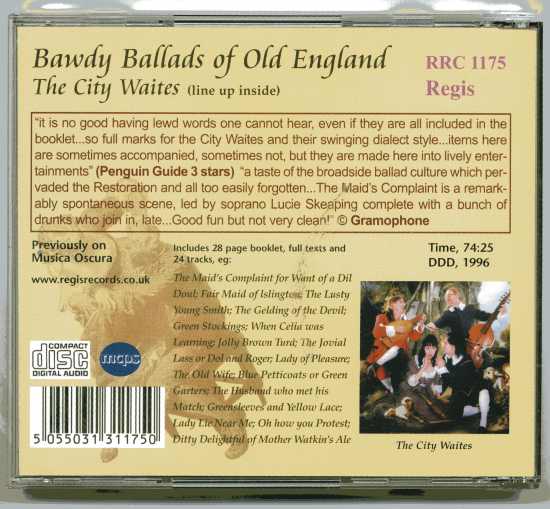- The City Waites
-
 Bawdy Ballads of Old England: The Mufitians of Grope Lane
Bawdy Ballads of Old England: The Mufitians of Grope Lane

- Diddle Diddle or The Kind Country Lovers Time: 2:57
- The Fair Maid of Islington Time: 3:34
- Green Stockings Time: 2:09
- The Jovial Lass or Dol and Roger Time: 3:42
- Mundanga Was Time: 2:32
- Lady of Pleasure Time: 1:35
- The Old Wife Time: 1:58
- The Beehive Time: 2:19
- Blue Petticoats or Green Garters Time: 1:55
- The Gelding of the Devil Time: 5:44
- The Maid's Complaint for Want of a Dil Doul Time: 4:36
- Oyster Nan Time: 2:17
- The Frolic Time: 1:58
- The Husband who met his Match Time: 4:35
- The Jovial Broom Man Time: 2:37
- The Disappointment Time: 3:19
- The Lusty Young Smith Time: 2:15
- Greensleeves and Yellow Lace Time: 2:17
- The Jolly Brown Turd Time: 1:36
- Two Rounds: Tom Making a Manteau; When Celia was Learning Time: 2:53
- Lady Lie Near Me Time: 1:31
- Oh how you Protest Time: 1:32
- A Ditty Delightful of Mother Watkin's Ale Time: 3:12
- Miss Nelly Time: 2:15
-
Bawdy Ballads of Old England / "The Mufitians of Grope Lane" / City Waites
'Extraordinary how potent cheap music is' remarked Noel Coward. By rummaging in the bargain basement of England's rich musical heritage, The City Waites have pulled out a priceless bundle - the forgotten penny broadsides and songs that were churned out in their thousands by the hacks of Seven Dials in Covent Garden, the Tin Pan Alley of 17th century London. Whatever its value at the time, the vitality and humour of this music transcends the centuries and now, it lives again.
Broadside ballads, and the popular tunes to which they were sung, were everyday musical fare. Whistled and hummed in all walks of life from courtier to ploughman, they were as likely to be bought for domestic amusement as pinned up on a tavern wall where they were often used to keep out a draught!. The songs on this recording, however, served yet another purpose: to complement a lewd scene in a theatre, to cozen a market-place gathering, or generally to 'stir up unchaste thoughts' in taverns and bawdyhouses up and down the land.
The street name Grope Lane - or sometimes Gropecuntlane - existed in a number of towns and parishes from medieval times and, while spellings varied, the message was unmistakable! This was the red-light district where whores plied their trade in brothels and stews (a stew, originally a steam-bath, was a legacy from the Romans, its association with brothels reinforced by the practice of sweating as a cure for venereal disease). Archives record a Gropecuntelane, dating back to the 13th century, in London's St Pancras district, and one in Oxford - now renamed Magpie Lane. In Northampton there was a Grappecuntelane; Wells in Somerset had its Gropecuntlane, while Chipping Barnet, Worcester, Bristol, Peterborough and York all had a Gropelane - the latter now renamed Grape Lane.
In London, the suburb of Southwark became particularly notorious for the variety of pleasures on offer. Here, along the bank of the Thames not far from the Globe Theatre and Bear Gardens, huddled the famous Southwark stews, painted white and often sporting the suggestive sign known as The Cardinal's Hat. The Winchester Geese, as the local prostitutes were called (the land was once owned by the Bishop thereof), were permitted to sit outside provided they did not openly solicit or throw stones at unwilling passers-by. One such establishment is immortalised in the broadside ballad The Jovial Broom Man. It was owned by the undisputed 'princess of whoredom' Donna Britannica Hollandia and became affectionately known to its patrons as Holland's Leaguer - a punning reference to the Anglo Dutch wars of the 17th century. Rather than his brave military exploits, this is then the reason why the soldier in the song has returned home 'naked, hungry, cold and dry' - he has spent all his money at the whorehouse!
Some prostitutes operated from the back rooms of ale-houses, welcome indeed since they increased business. In these low dives, often hidden away in ginnels and alleys, the less well off could dally with the most desperate drabs and jades. And in this seedy setting, musicians too had a part to play: Minstrels and itinerant ballad singers were seen by the authorities as 'toys to prick up wenches withal', since they were often used to whet the appetite of prospective clients with 'a ripe selection of bawdy songs, filthy ballads and scurvy rhymes, serving for every purpose and every company'. Prostitutes meanwhile, were able to explain away the presence of so many men by putting an 'instrument in sight to dazzle the eyes of every officer', claiming 'all that are lodged in the house by night, or frequent it by day, come hither as pupils to be well schooled [in music]'. One Mr Barnes of Bishops Stortford in Essex even set his young sons to singing in brothels where 'the one in squeaking treble, the other in an ale blown bass, they carole out such adultrous ribauldry as chaste ears abhor to hear and modesty hath no tongue to utter.' While they sang, the old man feigned admiration at 'the lascivious under-songs of Watkin's Ale' (Track 23 here), and others, sung with such 'detested boldness, as if there be one line in those lewd tongs than other more abhominable, that with a double repetition is loudly bellowed. The father leaps, the lubbers roar, the people run, the Devil laughs, God lowers and good men weepe'.
There was a further connection between the ballad singer and the criminal underworld; Music was often used to engage the attention of the listener while another familiar character went about his business - the cutpurse or pick-pocket. Since an edict of Elizabeth I had effectively outlawed the more honest 'old-style' minstrels, ballad singing and ballad peddling was undertaken mainly by a class of dubious fellows who would work the streets, inns and country fairs. Like Shakespeare's Autolycus, they usually sold copies of the ballads they sang and, like him, had any number of roguish tricks: gathering a large and eager crowd they might sing the first part of a long ballad (like The Gelding of the Devil), Stop it the most exciting bit - and then demand money to finish the story! Another ploy involved working with a confederate and shouting 'Ladies and gentlemen, look to your purses - there are pickpockets about!' at which cry, members of the crowd would pat their pockets, instantly revealing to the swift-fingered cutpurses the whereabouts of valuables! The Bishop Stubbes heartily condemned the whole 'tribe' of them as 'drunken sockets and bawdy parasites... singing of unclean, corrupt and filthy songs'.
Theatres were also closely linked with vice, many owners of the former, Henslowe, Alleyn, Longley and others - also earning a fat living from the latter. On stage, between dramatic scenes, the bawdy comic interludes known as Jigges, with their 'scurrilous songs and obscene gestures', would act as appetizers for later pleasures. Off stage, some theatres, it was claimed, acted as a front, or even an ante-room, for brothels. The poet and playwright John Dryden wrote: 'The playhouse is their [the prostitutes] place of traffic, where nightly they sit to sell their rotten ware.
The ballad texts on this recording are full of provocative metaphors. For example, the suggestive symbol of 'my dog and I' {Diddle Diddle or The Kind Country Lovers) is found in many ballads; elsewhere the 'dog' becomes a 'pipe of wine' {The Fair Maid of Islington). A more aggressive masculine imagery is reflected in the 'banging and hammering' of The Lusty Young Smith and the same idea applies in The Old Wife where the Miller 'grinds' both the 'corn' and the 'three sisters' until they are well and truly 'lericompooped'. The 'long pricked note' that Celia touches on the spinet {When Celia was Learning) is a pun on prick note - an early term for printed music.
A number of songs display a light-hearted mockery of country folk and their apparent naivety. Neither the 'sisters' in the The Old Wife nor the 'milkmaid' in Watkin's Ale seem quite to understand what is being done to them (though they seem to enjoy it!), while 'Dol' (Dol and Roger) and 'Sissly' {Disappointment) are for mitre knowing and make fools of the men. Some songs {The Maid's Complaint for want of a Dil Doul and Oyster Nan) fuel the male fantasy of the female pining for sex; and Mundanga Was and The Husband who met his Match make fun of the married state. Finally, in spite of its ripe language, The Beehive has a kind of sincere charm, while The Jolly Brown Turd takes lavatory humour to a new low class of dubious fellows who would work the streets, inns and country fairs. Like Shakespeare's Autolycus, they usually sold copies of the ballads they sang and, like him, had any number of roguish tricks: gathering a large and eager crowd they might sing the first part of a long ballad (like The Gelding of the Devil), Stop it the most exciting bit - and then demand money to finish the story! Another ploy involved working with a confederate and shouting 'Ladies and gentlemen, look to your purses - there are pickpockets about!' at which cry, members of the crowd would pat their pockets, instantly revealing to the swift-fingered cutpurses the whereabouts of valuables! The Bishop Stubbes heartily condemned the whole 'tribe' of them as 'drunken sockets and bawdy parasites... singing of unclean, corrupt and filthy songs'.
Theatres were also closely linked with vice, many owners of the former, Henslowe, Alleyn, Longley and others - also earning a fat living from the latter. On stage, between dramatic scenes, the bawdy comic interludes known as Jigges, with their 'scurrilous songs and obscene gestures', would act as appetizers for later pleasures. Off stage, some theatres, it was claimed, acted as a front, or even an ante-room, for brothels. The poet and playwright John Dryden wrote: 'The playhouse is their [the prostitutes] place of traffic, where nightly they sit to sell their rotten ware.
The ballad texts on this recording are full of provocative metaphors. For example, the suggestive symbol of 'my dog and I' {Diddle Diddle or The Kind Country Lovers) is found in many ballads; elsewhere the 'dog' becomes a 'pipe of wine' {The Fair Maid of Islington). A more aggressive masculine imagery is reflected in the 'banging and hammering' of The Lusty Young Smith and the same idea applies in The Old Wife where the Miller 'grinds' both the 'corn' and the 'three sisters' until they are well and truly 'lericompooped'. The 'long pricked note' that Celia touches on the spinet {When Celia was Learning) is a pun on prick note - an early term for printed music.
A number of songs display a light-hearted mockery of country folk and their apparent naivety. Neither the 'sisters' in the The Old Wife nor the 'milkmaid' in Watkin's Ale seem quite to understand what is being done to them (though they seem to enjoy it!), while 'Dol' (Dol and Roger) and 'Sissly' {Disappointment) are for mitre knowing and make fools of the men. Some songs {The Maid's Complaint for want of a Dil Doul and Oyster Nan) fuel the male fantasy of the female pining for sex; and Mundanga Was and The Husband who met his Match make fun of the married state. Finally, in spite of its ripe language, The Beehive has a kind of sincere charm, while The Jolly Brown Turd takes lavatory humour to a new low!
The City Waites
Taking their name from the professional town musicians of earlier times, The City Waites specialise in the songs and dances of the street and countryside, the stage and tavern - the music of the common man. The group rates highly the spontaneity, theatricality and improvisation skills of their 17th century counterparts and, although they have all had a formal musical training and solid grounding in the early music world, their performances summon up the exuberance of an early tavern or Jigge band - a combination that has earned them the respect both of scholars and a general audience.
In venues ranging from major Concert halls, international festival and arts centres to pubs, clubs and student unions, The City Waites perform concerts and workshops throughout the UK, much of Europe, the Middle and Far East and the USA. Their TV and radio broadcasts include concerts, documentaries and arts features on the music and times of Samuel Pepys, Henry VIII, Nell Gwyn, Robin Hood, English folklore and 1 7th century pornography. Collaborations include the National Theatre and the Royal Shakespeare Company, through whom they were awarded an Arts Council Grant to research the Elizabethan stage Jigge.
Lucie Skeaping originally wanted to be the virtuoso violinist Ida Haendel bat gave up that ambition having played in one freezing church too many. After the Royal College of Music, where she studied the lute with Diana Poulton and wore hot pants, she took the natural step of joining the Ken Dodd dancers, working in variety with Ivan Ivanovich (The Smallest Strongman in the World) and touring Europe with the pre punk all girl band The Sadista Sisters, before the big time finally beckoned by presenting BBC television's Playschool. Luckily she was saved when she discovered broadside ballads and has never looked back. She also specialises in singing traditional Jewish music with her other group The Burning Bush and, as a frequent BBC broadcaster she appears on arts programmes including her own weekly series on early and traditional music.
Roddy Skeaping's entire family invented Early Music in the 1950s and he is constantly mistaken for his three brothers who all share the same spectacles. He played with many of the first ensembles on the British scene including the English Consort of Viols, the Academy of Ancient Musicke and the late David Munrow's Consort. He was appointed Leverhulme Research Fellow at the Royal College of Music where he ran the New Violin Family, an off-the-wall set of scientifically matched violin-type instruments developed in the US. Apart from The City Waites he is a prolific composer, his works having been performed at London's Queen Elizabeth Hall, in St Petersburg and the US. Well known for his inventive incidental music for various National Theatre productions, his own nightly performances there included gripping a violin bow between his teeth and spinning a plate on the end, whilst playing a tune.
From shampoo factory to John Dowland, the road has been hard and long for Douglas Wootton. Through his sheer commitment, The City Waites graduated from Melody Maker's Second Best Folk Band of the Year to become a force to be reckoned with on the classical music scene. From his pony- tail to his blue suede shoes, Douglas was having no nonsense. Not for him the Laura Ashley school of Early Music; not for him the usual conventions of the concert platform: when Douglas gets an audience he squeezes it until the pips squeak - and they love it. One of the few tenors to accompany himself on the lute, he also writes musicals for children.
Michael Brain was a chorister at Westminster Abbey and it was downhill all the way after that. He is a fantastic roadie, tour manager, route planner and hassler for asparagus quiche (the Official Gig Food). He is also a superlative curtal player, baroque bassoonist, recorder and oboe player, continuing an illustrious family line which includes the famed horn player Dennis Brain. Although he loves The City Waites he is proud to have large quantities of what he calls 'outside work' and never fails to remind the band - at moments of artistic tension - that he could be employed elsewhere. On stage his big moment comes when he describes the construction of early woodwind instruments, and he talks with particular relish about the 'U-bend' at the base of the curtal - not unrelated to his other major talent for putting in bathroom plumbing.
Credits
Arrangements: Roddy Skeaping; Producer: Anthony Rooley; Post Production: Dill Katz Recorded: By Black Box Music at The Premises, London (August 1995)
Regis Records Ltd, Southover House, Tolpuddle, Dorset DY2 7HF (UK) www.regisrecords.co.uk -for catalogue details and worldwide availability
We also recommend: RRC 1076 Praetorius: Dances from Terpsichore (with Lambranzi: Dances /
Arbeau's Orchesographie / Holbourne and Demantius / Praetorius Consort
Cover image: "Before the orgy" by Zichy courtesy www.fineartphotolibrary.com

The City Waites
Lucie Skeaping soprano; baroque violin
Douglas Wootton: tenor; lute; bandora; cittern; tabor
Roddy Skeaping: baroque violin; bass viol; voice; musical
arrangements
Michael Brain baroque bassoon; recorders; voice
Robin Jeffrey baroque guitar; cittern
Mike Sargeant early Northumbrian bagpipes; Flemish bagpipes
David Chatterley hurdy-gurdy
1 Diddle Diddle or The Kind Country Lovers 3,22
2 The Fair Maid of Islington 4,09
3 Green Stockings 2,21
4 The Jovial Lass or Dol and Roger 4.19
5 Mundanga Was 2,49 6 Lady of Pleasure 1.37
7 The Old Wife 2,06
8 The Beehive 233 9 Blue Petticoats or Green Garters 2.02
10 The Gelding of the Devil. 6.54
11 The Maid's Complaint for Want of a Dil Doul 5.27
12 Oyster Nan 2.20
13 The Frolic 2.06
14 The Husband who met his Match 5.27
15 The Jovial Broom Man 23b
16 The Disappointment 3.49
17 The Lusty Young Smith 2.28
18 Greensleeves and Yellow Lace 2.31
19 The jolly Brown Turd 1.37
20 Two Rounds: Tom Making a Manteau; When Celia was Learning 3.l6
21 Lady Lie Near Me 1.31
22 Oh how you Protest 1.33
23 A Ditty Delightful of Mother Watkin's Ale 3.41
24 Miss Nelly 230
